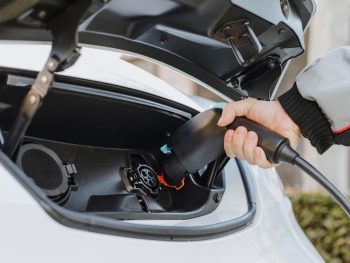Supply shortages of electric vans are obstructing fleets from transitioning to cleaner vehicles, the Climate Group has warned.

The international NGO represents 28 leading UK fleets such as BT Openreach, LeasePlan and Royal Mail through its UK Electric Fleets Coalition – and said many businesses are ready to invest in EVs but are unable to secure the vehicles that meet their specifications in the quantity they need.
Latest figures from the Society of Motor Manufacturers and Traders (SMMT) show that 4.1% (or one in 24) of new van registrations in May were battery electric vehicles (BEVs), almost identical to the 4.0% for the same month in 2022.
While there are more than 25 electric van models now available in the UK, there is much wider variety and availability in the new car market, where the BEV market share is some four times greater (16.9%).
The UK is due to implement the first sales targets for zero-emission cars and vans from 2024 through the zero-emission vehicle (ZEV) mandate – details of which are still to be revealed – and the Climate Group warns that manufacturers “have a mountain to climb” to ramp up variety and quantity ahead of next year.
And it says much more needs to be done to ensure the UK meets its 2030 commitment to phase out sales of new petrol and diesel cars and vans.
Alongside manufacturers clearing the backlog of demand, the group is calling for the Government to step up its ambition to help UK businesses make the switch.
This includes rapid expansion for the UK’s charging network – a reliable, affordable charging network is needed to support the growing number of businesses wanting to invest in EVs. This includes investment in kerbside charging – electric van drivers are far less likely to be able to have a driveway where they can install home charging.
The Climate Group also says a strong, ambitious ZEV mandate will help supply match demand, and speed up EV adoption.
Sandra Roling, director of transport at the group, said: “Market uptake of electric vans must accelerate. The businesses we work with are keen to buy the vehicles, but they can’t get them in the number and specifications they need.
“An ambitious ZEV mandate is one of the most important measures the UK government can introduce to rapidly increase market supply, alongside continued investment in charging infrastructure across the country.”
The National Franchised Dealers Association (NFDA) also spoke out last week to say that a lack of action by the Government is holding back adoption of electric vans and slowing the growth of market share. Its Commercial Vehicles division has sent a letter, urging the Government to provide a response to its own consultation on the weight classification of electric vans in the UK and ways to support operators switching to eLCVs. Although the consultation closed in October last year, the DfT is yet to provide a response and the NFDA-CV says it’s repeatedly called for the naturally heavier EVs not to fall into the O Licence regulatory class, which brings a raft of safety measures and licensing that present extra challenges for fleets.
The Association of Fleet Professionals (AFP) has also warned that restrictions on heavier electric vans are hampering fleet take-up and is lobbying for change too.

